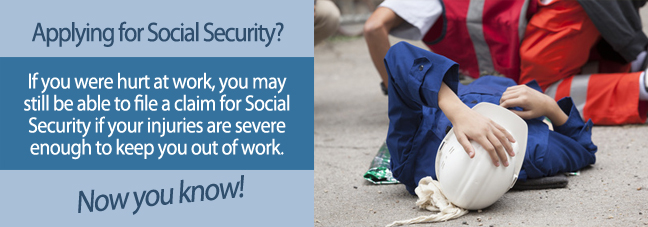If you become disabled, for any reason, you can file a disability claim with the Social Security Administration (SSA). Only long-term disabilities meet the SSA’s basic requirements though, and getting workers’ compensation or disability benefits from an employer can affect Social Security disability in some cases.
A Social Security advocate or attorney can help you understand the SSA’s rules and assist with determining exactly when the time is right for filing your disability claim.
Social Security Disability and Other Benefits
To get approved for disability, you must have a serious medical condition that will or has put you out of work for at least 12 months. If you were injured on the job, then you’re entitled to workers’ compensation.
Short-term disability through an employer may apply in your case too. Once a medical leave has lasted long enough and you’re still unable to return to work, short-term disability will expire and long-term disability insurance may kick in, if your employer offers it or you carry a private policy.
Applying for Disability While Getting Other Benefits
Although you can apply for benefits even while workers’ comp and short-term disability cover your medical leave of absence, you’re unlikely to meet the SSA’s basic eligibility requirements at this time. The SSA may dismiss your claim or may put it on hold until more time has passed.
If however, your work injury or work-related illness is so severe that it will prevent you from ever returning to the job, then you may be able to get approved for Social Security disability even while receiving other benefits.
How Other Disability Programs Affect Social Security Disability
It’s important to keep in mind though that compensation you receive from workers’ comp and short- or long-term disability insurance plans can have affect Social Security approval. Social Security Disability Insurance (SSDI) will not be affected, but Supplemental Security Income (SSI) will.
This is because SSI is need-based, and the SSA considers all income and financial assets when determining eligibility. You may therefore not be eligible for SSI while receiving other benefits. Once long-term, private or employer sponsored disability coverage expires though, you may become eligible for SSI.

Unemployment Compensation and Disability Benefits
You cannot receive unemployment compensation and apply for disability benefits through SSDI or SSI. This is because unemployment implies that you are able to work and are actively seeking a new job.
Social Security disability coverage on the other hand is only available if you are so severely impaired that you cannot get and/or keep a job in which you can earn a substantial living.
These programs therefore conflict and the SSA will deny you disability benefits if you are currently receiving or have recently applied for unemployment.
Getting Help with a Disability Claim and Submitting an Application
You can file for SSDI online, or SSI and SSDI at the local Social Security office. Either way though, it can be hard to know just when you should submit an application. A disability advocate or attorney can easily advise you on this.
He or she can also assist with filing your claim, supporting it with appropriate evidence, and with arguing your case, if additional reviews or an appeal is required.